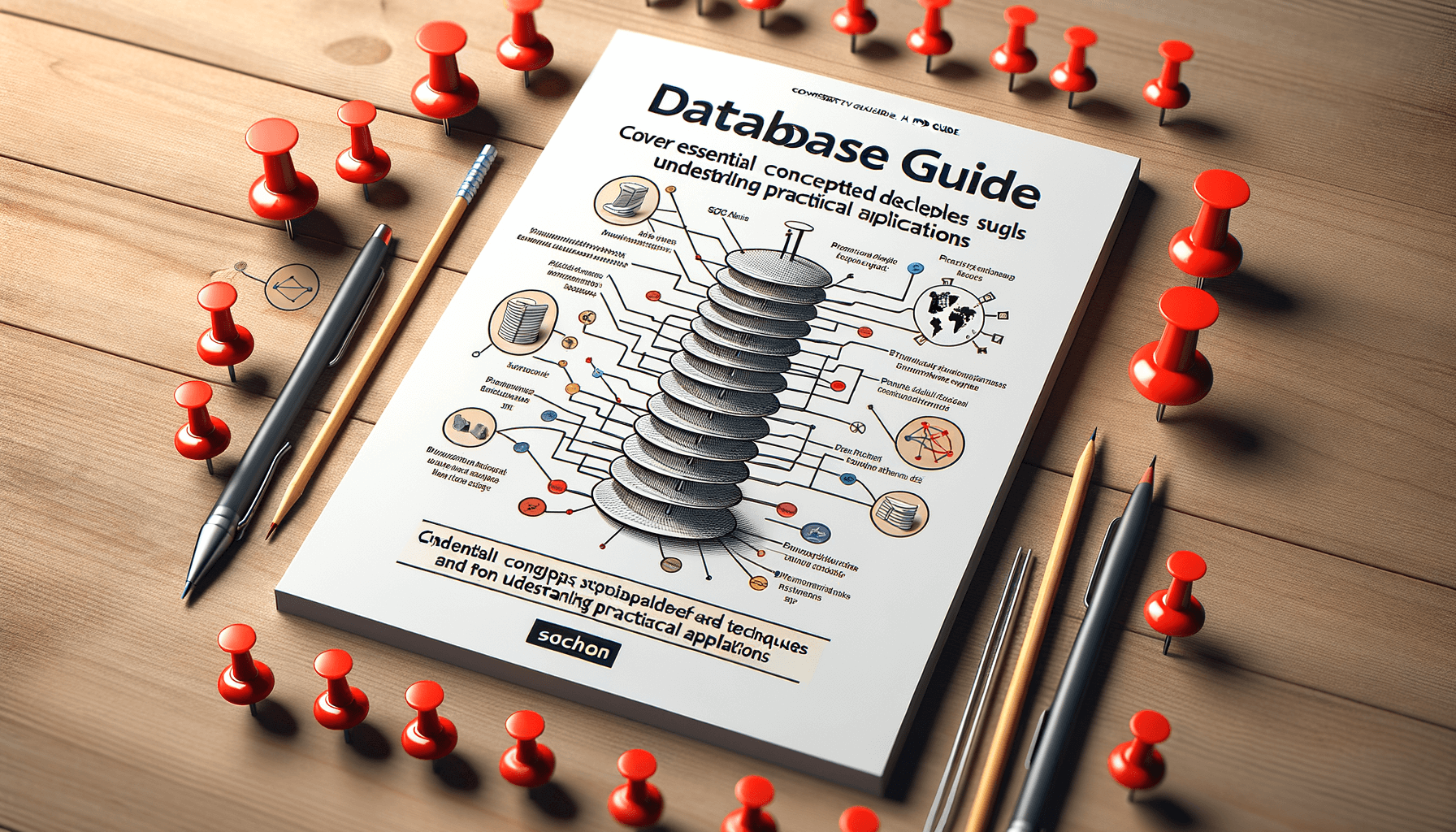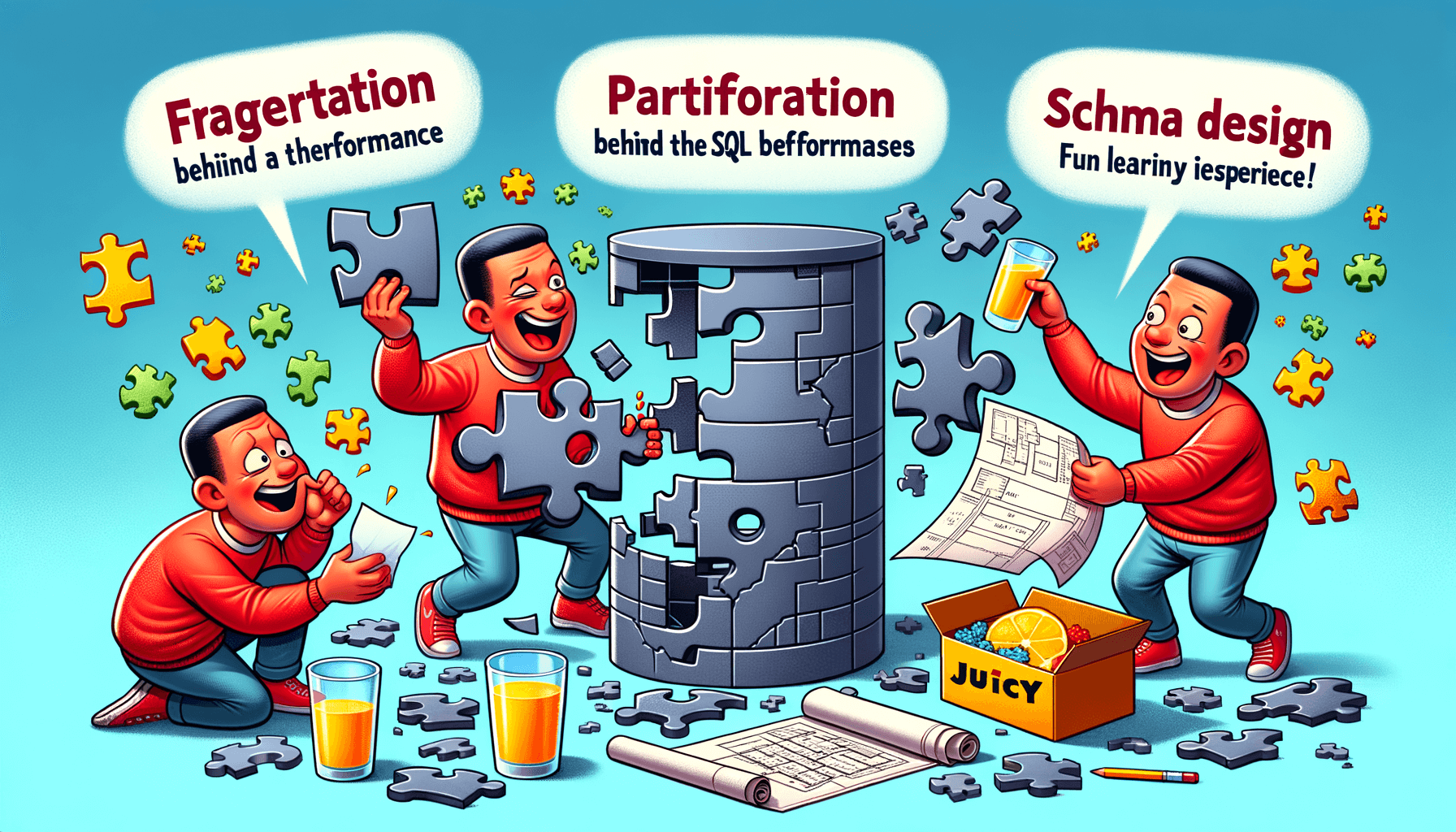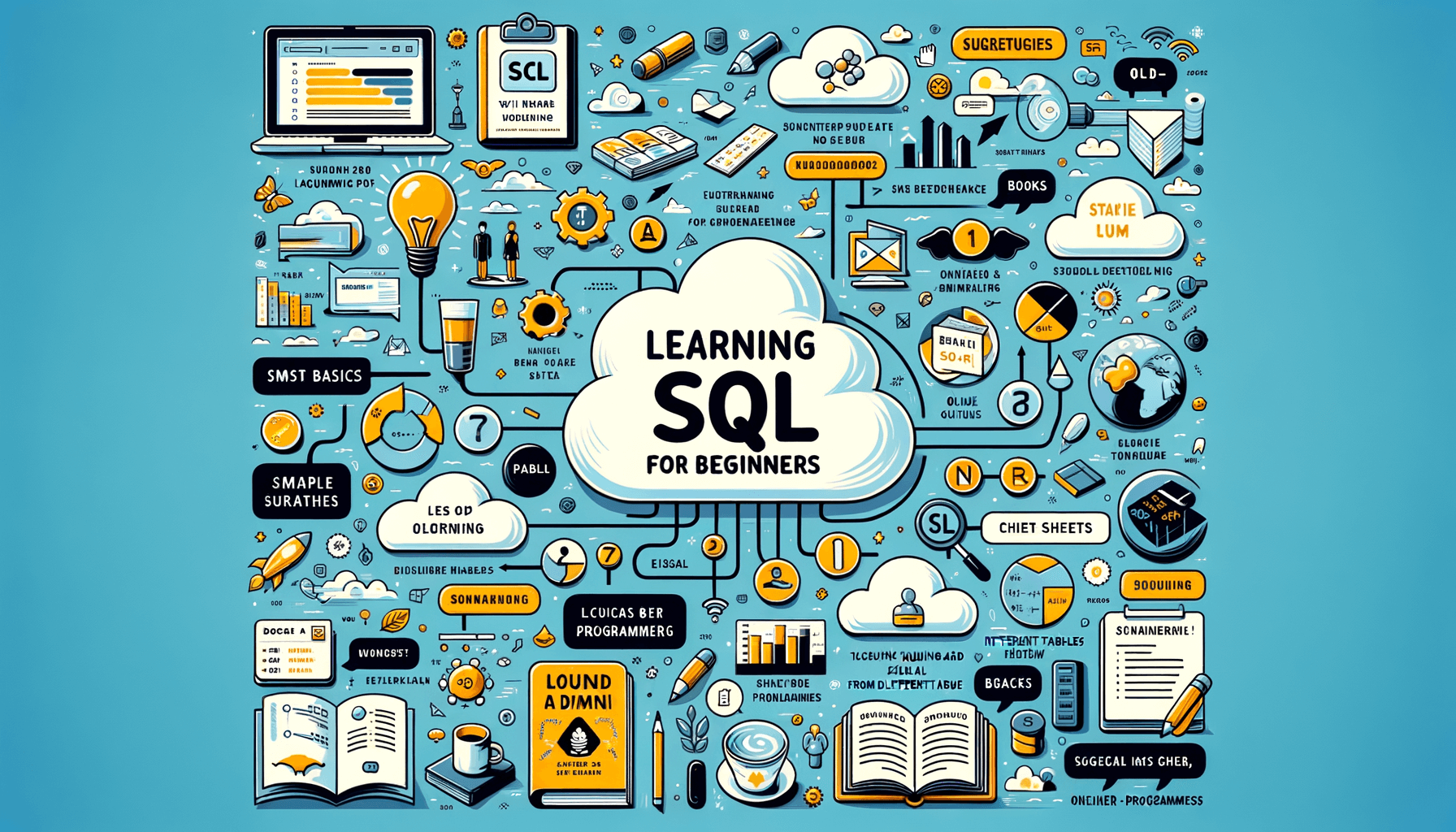A big variety of articles and resources

Master SQL with Our Comprehensive Learning SQL PDF Guide
 Sia Author and Instructor
Learn SQL
Sia Author and Instructor
Learn SQL
9 minute read
SQL is a powerful tool for managing and analyzing data. Our guide will help you learn SQL from the basics to advanced techniques. Whether you're a beginner or looking to improve your skills, this guide has something for everyone.
Key Takeaways
- SQL is essential for managing data in many industries.
- Basic SQL commands are the foundation for more advanced techniques.
- Advanced SQL skills can help you analyze data more effectively.
- Optimizing SQL performance is important for fast and efficient databases.
- There are many resources available to help you master SQL.
The Importance of SQL in Modern Data Management
Role of SQL in Databases
SQL is the backbone of most database systems. It allows us to store, retrieve, and manage data efficiently. Without SQL, handling large amounts of data would be nearly impossible. This language helps us keep our data organized and accessible.
SQL vs. NoSQL: A Comparative Analysis
When comparing SQL and NoSQL, it's important to understand their differences. SQL databases are structured and use tables, while NoSQL databases are more flexible and can handle unstructured data. Each has its own strengths and weaknesses, making them suitable for different tasks.
Industry Applications of SQL
SQL is used in many industries, from finance to healthcare. It helps businesses analyze data, make decisions, and improve operations. For example, in business intelligence, SQL is crucial for generating reports and insights. This makes it easier to fit data & SQL skills into your busy life with micro-courses. Master SQL basics, perfect for beginners, learn at your own pace. Login or sign up for free.
SQL is a powerful tool that plays a vital role in modern data management. Its ability to handle large datasets and provide quick access to information makes it indispensable in today's data-driven world.
Foundational Concepts in SQL
Understanding SQL Syntax
SQL syntax is the foundation of working with databases. It includes rules and guidelines for writing SQL statements. Mastering SQL basics for beginners is crucial for anyone looking to work with data. The syntax is straightforward, but attention to detail is essential.
Data Types and Their Uses
In SQL, data types define the kind of data that can be stored in a table. Common data types include integers, strings, and dates. Each data type has specific uses and limitations. Understanding these will help you design better databases and write more efficient queries.
Basic SQL Commands
Basic SQL commands are the building blocks of database management. These include commands like SELECT, INSERT, UPDATE, and DELETE. Learning these commands allows you to interact with and manipulate data effectively. You can learn at your own pace and start with simple queries before moving on to more complex ones.
Knowing the foundational concepts in SQL is the first step towards becoming proficient in data management. It sets the stage for more advanced techniques and applications.
Advanced SQL Techniques for Data Analysis
Complex Queries and Joins
In this section, we dive into the world of complex queries and joins. These techniques allow us to combine data from multiple tables, providing a more comprehensive view of our datasets. Mastering these skills can significantly enhance our ability to analyze data effectively. We will explore various types of joins, including inner joins, outer joins, and self-joins, each serving a unique purpose in data analysis.
Subqueries and Nested Queries
Subqueries and nested queries are powerful tools in SQL that enable us to perform more sophisticated data retrieval operations. By embedding one query within another, we can create more dynamic and flexible queries. This technique is particularly useful when dealing with hierarchical data or when we need to filter results based on complex criteria. Understanding how to effectively use subqueries can greatly improve our SQL capabilities.
Window Functions and Their Applications
Window functions are advanced SQL features that allow us to perform calculations across a set of table rows related to the current row. These functions are essential for tasks such as running totals, moving averages, and ranking. By using window functions, we can gain deeper insights into our data without the need for complex joins or subqueries.
Enhancing our SQL skills with advanced functions and sorting techniques can give us a competitive edge in business intelligence. Practical skills enhancement through real-world problems is key to mastering these techniques.
Optimizing SQL Performance
Indexing Strategies
To make your SQL queries run faster, you need to use indexing strategies. Indexes help the database find data quickly without scanning every row. Proper indexing can drastically improve query performance. However, too many indexes can slow down data modification operations like INSERT, UPDATE, and DELETE.
Query Optimization Techniques
Optimizing your queries is crucial for efficient database management. Simple changes, like selecting only the columns you need, can make a big difference. Using joins instead of subqueries can also speed up your queries. At sqlskillz.com, we offer a course that specializes in performance optimization and data architecture.
Database Normalization
Normalization is the process of organizing data to reduce redundancy. This makes your database more efficient and easier to maintain. There are different levels of normalization, known as normal forms. Each level has specific rules to follow. While normalization helps in many ways, over-normalizing can make your queries more complex and slower.
Efficient SQL performance is key to managing large datasets effectively. By focusing on indexing, query optimization, and normalization, we can ensure our databases run smoothly and efficiently.
Practical Applications of SQL in Real-World Scenarios
SQL in Business Intelligence
In the world of business intelligence, SQL is a powerful tool. It helps us turn raw data into meaningful insights. We can make better decisions by analyzing trends and patterns. SQL allows us to create reports and dashboards that show key metrics. This way, businesses can track their performance and plan for the future.
SQL for Data Warehousing
Data warehousing is another area where SQL shines. It helps us store and manage large amounts of data. With SQL, we can organize this data in a way that makes it easy to access and analyze. This is crucial for businesses that rely on data to make decisions. By using SQL, we can ensure that our data is accurate and up-to-date.
SQL in Web Development
In web development, SQL is used to manage databases that store user information, content, and other data. It allows us to create dynamic websites that can handle a lot of traffic. For example, an e-commerce site might use SQL to keep track of products, orders, and customers. This makes it easier to update the site and keep everything running smoothly.
From zero to PostgreSQL junior DBA, our course offers practical SQL learning with real-world problems, hands-on projects, and expert-led training. Instructor Eric Vanier has 25+ years of experience in database management.
Resources for Mastering SQL
Recommended Books and Articles
To truly master SQL, we recommend diving into some well-regarded books and articles. These resources provide in-depth knowledge and practical examples to help you understand complex concepts. Books like 'SQL for Dummies' and 'Learning SQL' are great starting points. Articles from reputable websites can also offer valuable insights and updates on the latest SQL trends.
Online Courses and Tutorials
Online courses and tutorials are excellent for learning at your own pace. Websites like sqlskillz.com vs codecademy.com offer comprehensive courses that cover everything from basic to advanced SQL techniques. Many of these platforms allow you to sign up for free, making it easy to get started without any financial commitment.
Utilizing the Learning SQL PDF Guide
Our Learning SQL PDF Guide is a fantastic resource for both beginners and advanced users. It covers a wide range of topics, from foundational concepts to advanced techniques. The guide is designed to be user-friendly, with clear explanations and practical examples. By following this guide, you can build a strong foundation in SQL and advance to more complex topics with confidence.
The right resources can make a significant difference in your learning journey. Choose wisely and make the most of the tools available to you.
Looking to become a SQL expert? Our website offers a range of courses designed to help you master SQL. Whether you're a beginner or looking to advance your skills, we have something for everyone. Visit us today to explore our course catalog and start your learning journey!
Conclusion
In conclusion, mastering SQL is a valuable skill that opens many doors in the tech world. Our comprehensive Learning SQL PDF Guide is designed to help you understand and apply SQL concepts with ease. By following the guide, you will gain the knowledge needed to manage databases effectively. Whether you are a beginner or looking to refresh your skills, this guide provides clear explanations and practical examples. Start your journey today and unlock the potential of SQL in your career.
Frequently Asked Questions
What is SQL and why is it important?
SQL stands for Structured Query Language. It's a tool used to manage and manipulate databases. It's important because it helps in storing, retrieving, and managing data efficiently.
How is SQL different from NoSQL?
SQL is used for structured data, while NoSQL is used for unstructured data. SQL databases are table-based, and NoSQL databases can be document-based, key-value pairs, or graph databases.
Can I use SQL for web development?
Yes, SQL is commonly used in web development to manage and retrieve data from databases. It helps in creating dynamic websites that can interact with databases.
What are some basic SQL commands I should know?
Some basic SQL commands include SELECT, INSERT, UPDATE, DELETE, and CREATE TABLE. These commands help you perform common tasks like retrieving data, adding data, updating data, deleting data, and creating tables.
How can I optimize my SQL queries?
You can optimize SQL queries by using indexing, avoiding unnecessary columns in SELECT statements, and writing efficient joins. Proper indexing helps in faster data retrieval.
Where can I find resources to learn SQL?
You can find resources to learn SQL through books, online courses, tutorials, and guides like our Learning SQL PDF Guide. These resources provide step-by-step instructions and examples to help you master SQL.
Related Articles

3 Juicy Secrets Behind Sluggish SQL!!
5 minute read

Can I learn SQL without any programming knowledge?
12 minute read

How Difficult Is SQL to Learn? A Comprehensive Guide
8 minute read




